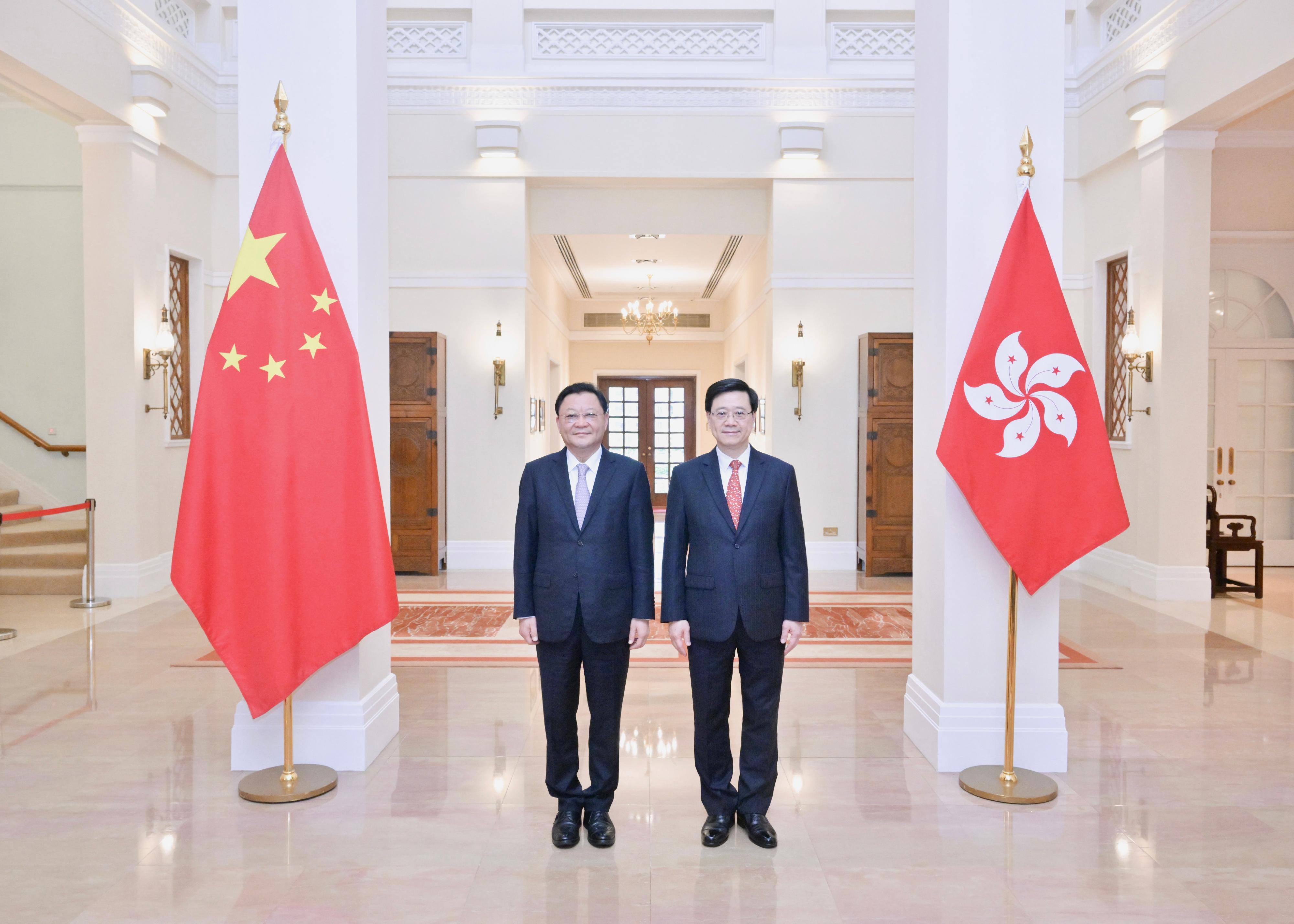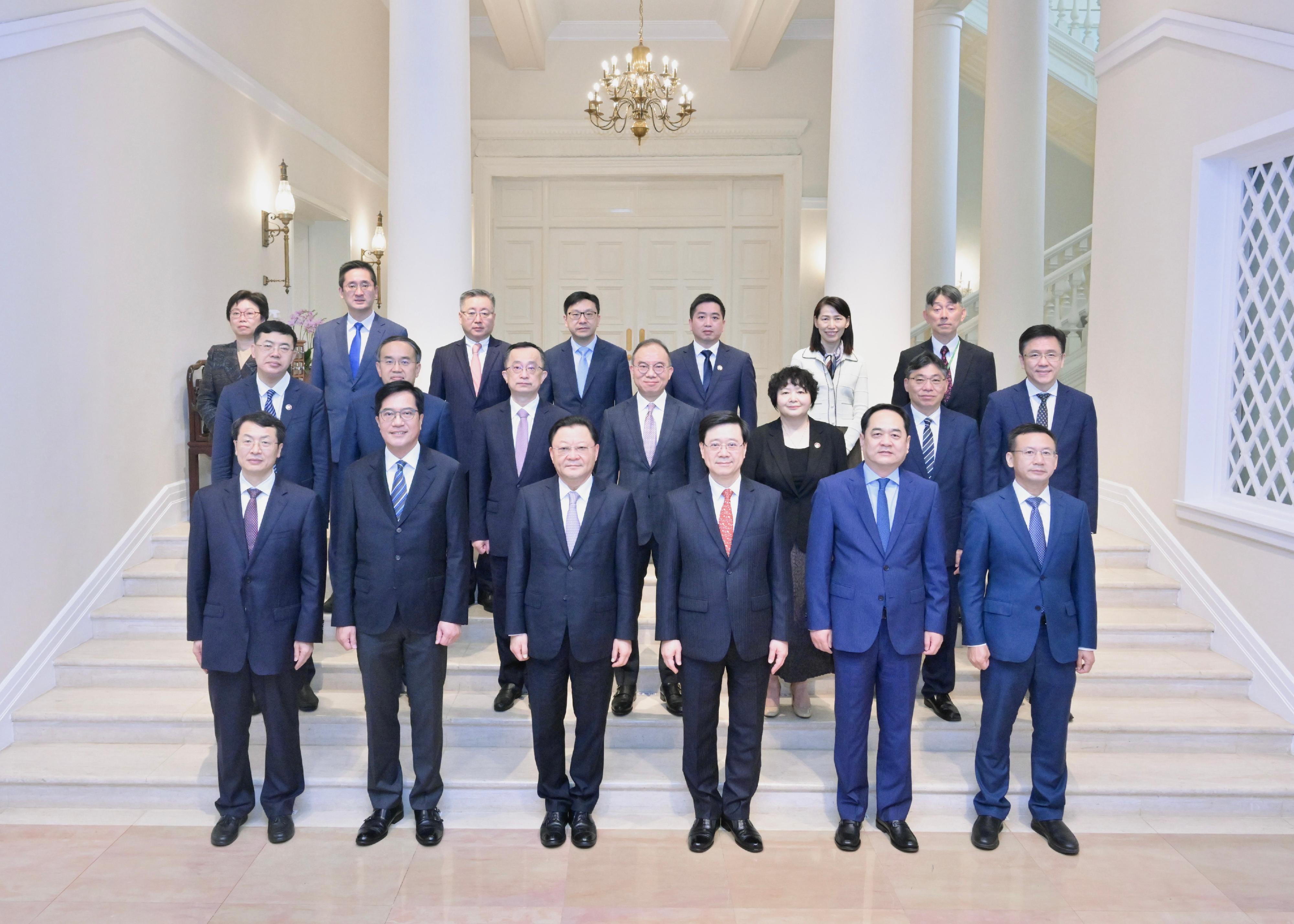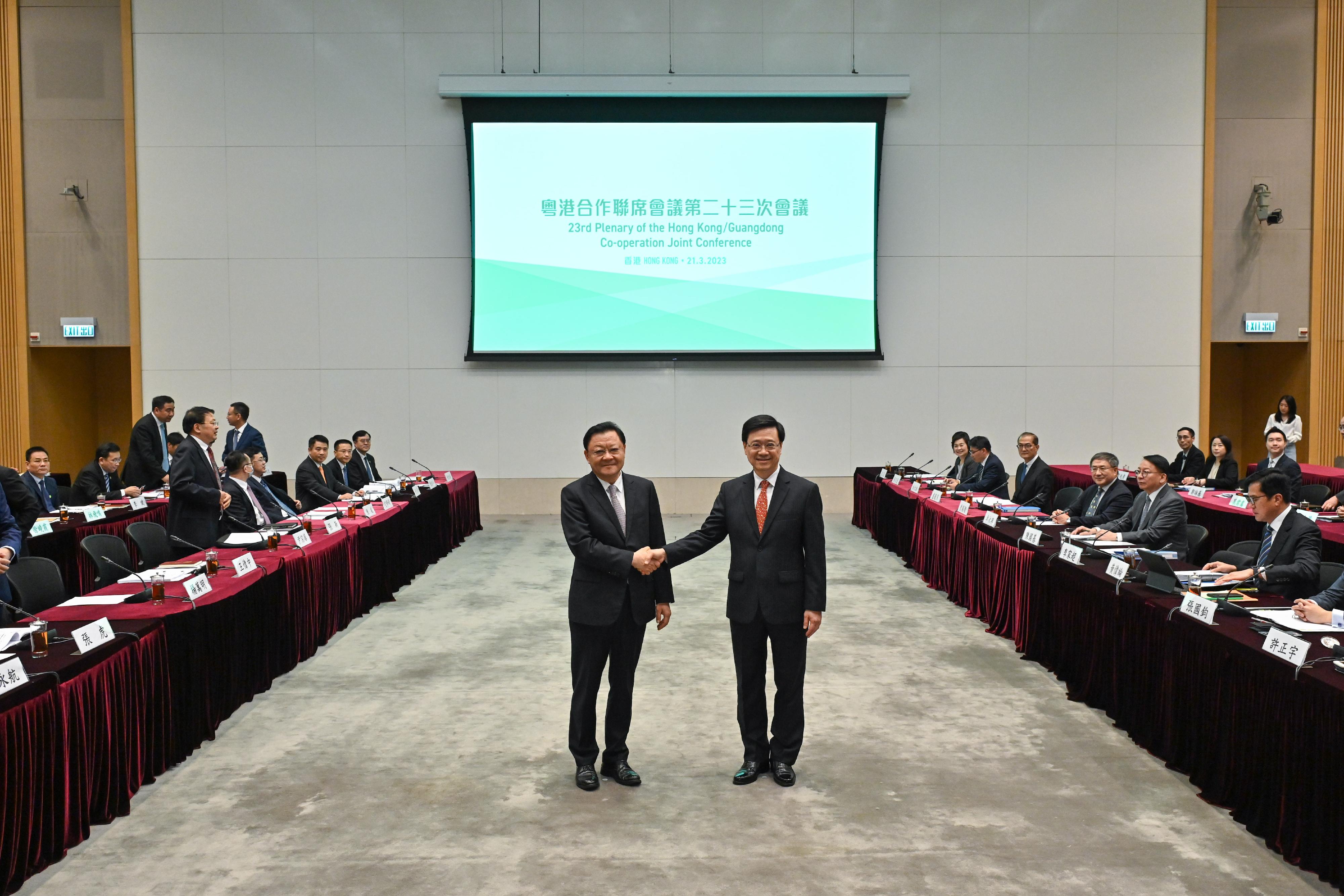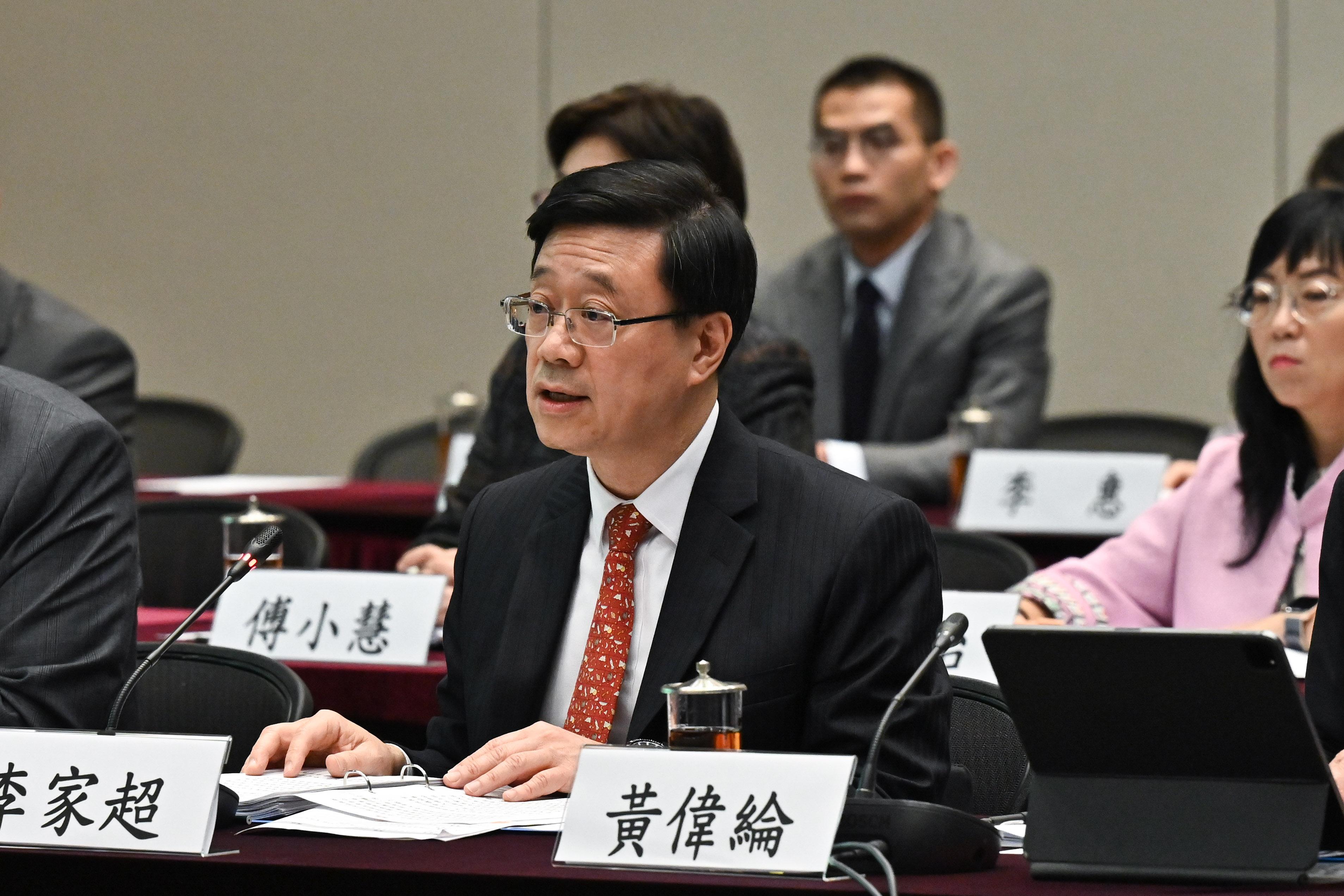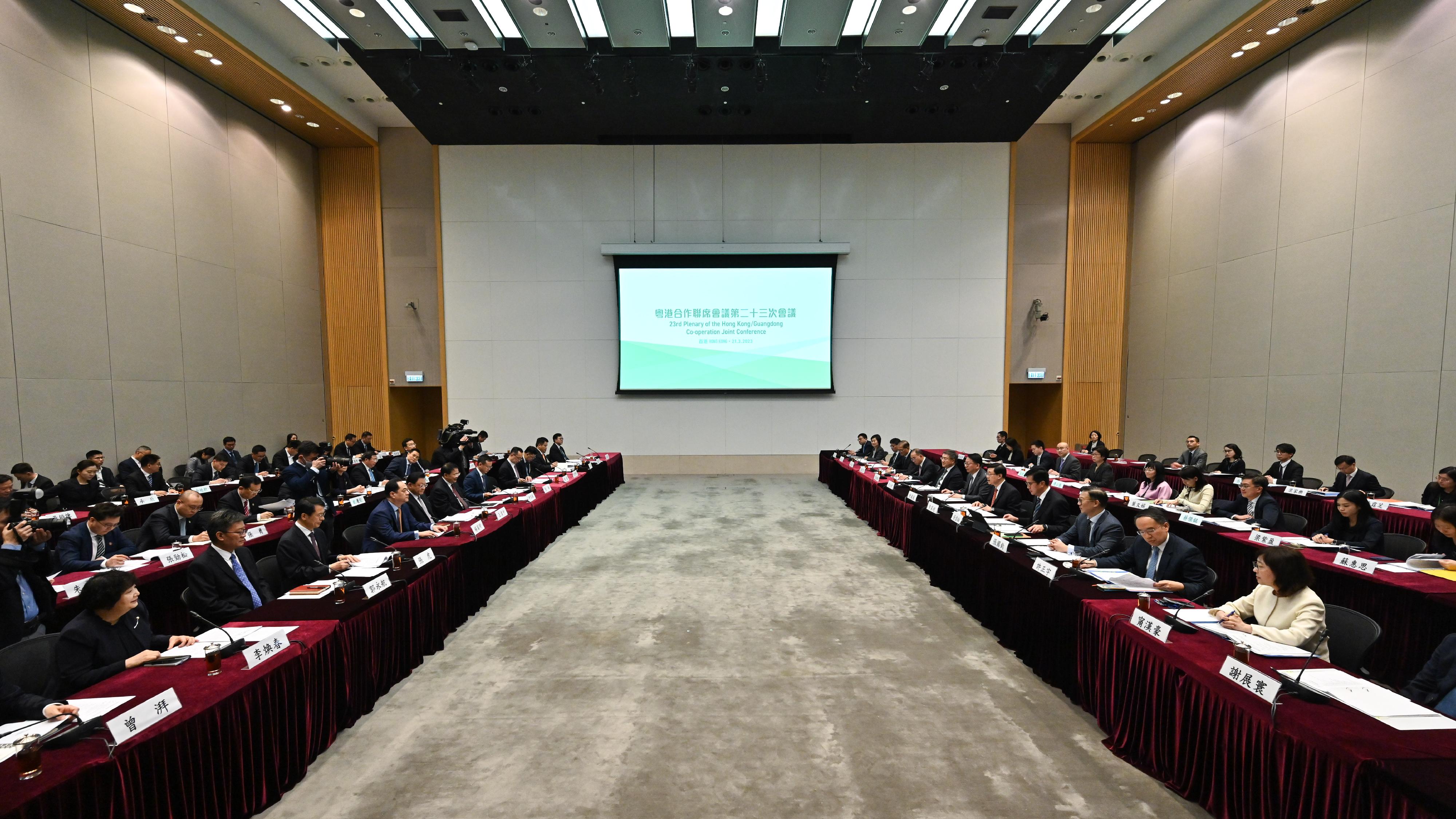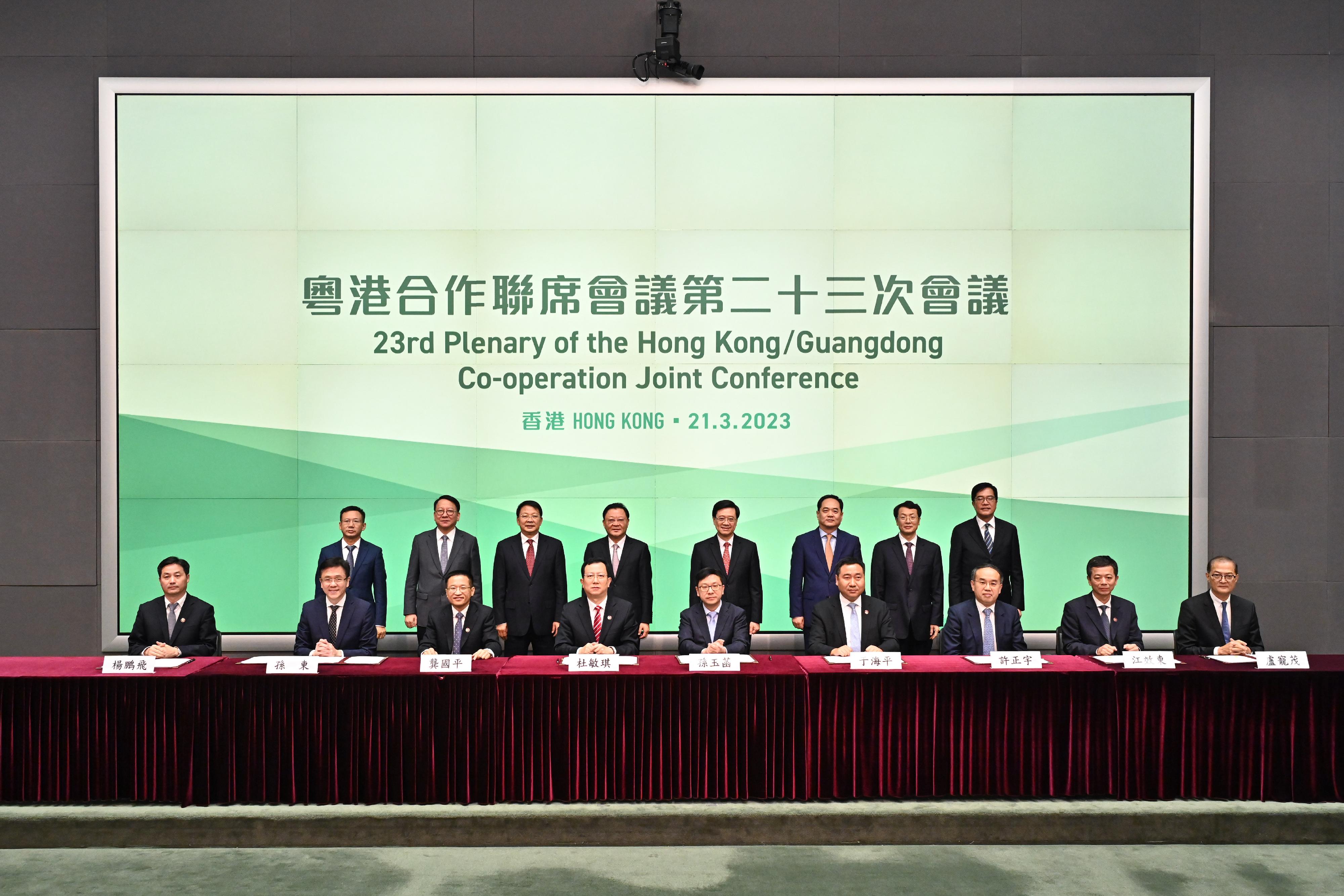23rd Plenary of Hong Kong/Guangdong Co-operation Joint Conference held (with photos/video)
The Chief Executive of the Hong Kong Special Administrative Region (HKSAR), Mr John Lee, and the Governor of Guangdong Province, Mr Wang Weizhong, leading the delegations of the HKSAR and Guangdong Province respectively, co-chaired the 23rd Plenary of the Hong Kong/Guangdong Co-operation Joint Conference yesterday (March 21). Deputy Director of the Hong Kong and Macao Affairs Office of the State Council, Mr Yang Wanming, and Deputy Director of the Liaison Office of the Central People's Government in the HKSAR, Mr Yin Zhonghua, also attended the meeting as special guests.
Mr Lee said, "Hong Kong will shoulder greater responsibility and mission in the national development. President Xi Jinping said that the great rejuvenation of the Chinese nation has embarked on an irreversible and historic journey, and that we must firmly promote high-quality development while always putting the people first and better co-ordinating development. In the process, Hong Kong should actively dovetail with national strategies and more proactively integrate into the overall development of the country, and in particular, step up our efforts in promoting the development of the Guangdong-Hong Kong-Macao Greater Bay Area (GBA)."
He added that, since the full resumption of normal travel between Hong Kong and the Mainland, both Guangdong and Hong Kong are pressing ahead at full steam to promote a higher level of co-operation between both sides and pursue high-quality development. He led a delegation to visit Guangzhou and Shenzhen at the first instance last month to discuss in great detail the further deepening of Hong Kong's co-operation and exchanges with Guangdong in different areas with Secretary of the CPC Guangdong Provincial Committee, Huang Kunming, and the Governor of Guangdong Province, Wang Weizhong. The HKSAR Government will lead all sectors of the community to actively participate in the development of the GBA, and foster a greater flow of factors of production such as people, goods, information and capital within the GBA, with a view to building the GBA as a first-class bay area for attracting and gathering top international technology talents.
The governments of Guangdong and Hong Kong have made steady progress in various co-operation areas. The progress made in individual areas and the directions set for future co-operation are outlined below.
Innovation and technology
��������������
Guangdong and Hong Kong have been in close collaboration in the development of innovation and technology (I&T). According to the Global Innovation Index 2022, the Shenzhen-Hong Kong-Guangzhou Science and Technology Cluster has been ranked second in the world for three consecutive years. Looking ahead, both sides will actively develop the Shenzhen-Hong Kong Technology and Innovation Co-operation Zone, which will provide important support to promote I&T development in the GBA and the country. Meanwhile, promoting high-quality economic development and accelerating the development of digital economy and smart city are some of the important measures taken by the HKSAR Government to contribute to the national policy of "Digital China".
To take I&T development in Guangdong and Hong Kong to new heights, the two sides signed two agreements after the meeting, including the renewal of the "Co-operation Agreement on Technology and Innovation Exchange between Guangdong and Hong Kong" to further deepen technology and innovation exchanges and co-operation between the two places, as well as to promote the development of an international I&T centre in the GBA. The two sides have also entered into the "Co-operation Agreement between Guangdong and the HKSAR on Co-developing a Smart City Cluster" with a view to stepping up mutual exchanges, expediting the development of digital economy and smart city, and jointly promoting the development of a Guangdong-Hong Kong smart city cluster.
Financial Services
���������
There has been close financial co-operation between Guangdong and Hong Kong all along. Leveraging the unique advantages of Hong Kong's financial system under "One Country, Two Systems" and our country's support to the financial liberalisation and innovation of the GBA, the HKSAR Government will join hands with Guangdong Provincial Government to contribute to the high-quality development of the GBA as well as the deepening of the reform of the country's financial markets.
The governments of both sides will jointly implement the "Opinion on Providing Financial Support for the Comprehensive Deepening Reform and Opening Up of the Qianhai Shenzhen-Hong Kong Modern Service Industry Co-operation Zone" and promote mutual access between the financial markets of the two places, including striving for the establishment of insurance after-sales service centres by the Hong Kong insurance industry in Nansha and Qianhai in the near future, so as to provide GBA residents who are holders of Hong Kong policies with comprehensive support. The HKSAR Government also supports Mainland companies to make use of Hong Kong's platform as an international financial centre and professional services for financing, particularly green and sustainable financing, so as to channel international capital to support the green transformation of our country's economy.
To promote deepened financial co-operation between both places, the Financial Services and the Treasury Bureau of the HKSAR Government and the Guangdong Financial Supervisory Authority signed the "Agreement on Enhancing Hong Kong-Guangdong Financial Co-operation" after the meeting.
Northern Metropolis Development
������������������
As a new engine driving the future development of Hong Kong, the Northern Metropolis serves as an important base for promoting I&T and the diversified development of industries. It also creates strong impetus for the growth of Hong Kong, facilitates high-quality economic co-operation between Hong Kong and the GBA, and provides more quality living space for the general public. Under the Guangdong-Hong Kong and Hong Kong-Shenzhen co-operation mechanisms, the Task Force for Collaboration on the Northern Metropolis Development Strategy has been set up to strengthen liaison and co-ordination between Hong Kong and the Mainland on matters related to the Northern Metropolis. The first meeting of the Task Force was held in late February this year in Shenzhen. Both sides exchanged views on the progress in planning and implementing the Northern Metropolis, the development plans in Shenzhen relevant to the Northern Metropolis, and related areas including cross-boundary transport, planning of control points, development of Qianhai, construction works at the Lok Ma Chau Loop, etc. Both sides agreed to continue strengthening co-operation, making full use of the synergy between the Northern Metropolis and the GBA cities in areas such as industry development, land use and ecological conservation, and the opportunities arising therefrom.
Commerce and Investment Promotion
��������������������
All along, Guangdong Province has been the most preferred investment destination of Hong Kong businesses and a valuable trading partner for Hong Kong. The HKSAR Government is grateful for the many liberalisation measures that have been launched continually by various cities of Guangdong Province for the benefits of Hong Kong businesses and professionals, and will continue to strive for the implementation of more liberalisation measures in the GBA and even the whole of the Mainland, thereby further advancing the liberalisation of trade between Guangdong and Hong Kong, as well as facilitating trading and investment.
On supporting Hong Kong enterprises to tap into the Mainland market, the Hong Kong Trade Development Council (HKTDC) has established the "HKTDC GBA Centre" in Shenzhen and "GoGBA Business Support Centres" in various Mainland cities of the GBA to assist Hong Kong enterprises in taking the GBA as an entry point to develop the domestic sales market. The network of "GoGBA Business Support Centres" will be expanded gradually to cover all nine Mainland cities of the GBA. The HKTDC will also organise the flagship events "SmartHK" in Guangzhou and "Chic HK" in Shenzhen during the "Guangdong-Hong Kong Co-operation Week" in May this year to promote Hong Kong's services and products.
InvestHK will continue to work closely with cities in Guangdong Province and organise various promotion activities, to appeal to more enterprises in Guangdong Province to make investments in Hong Kong or leverage Hong Kong's unique business environment as a "going-out" platform to expand overseas.
Cross-boundary Transport and Logistics
���������������������
The "Outline Development Plan for the Guangdong-Hong Kong-Macao Greater Bay Area" puts emphasis on expediting infrastructural connectivity, raising the standards of passenger and cargo transport services. To this end, the Heung Yuen Wai Boundary Control Point, connecting to Liantang Port of the Mainland, has been fully commissioned since February 6 this year. As regards the "Quota-free Scheme for Hong Kong Private Cars Travelling to Guangdong via the Hong Kong-Zhuhai-Macao Bridge (HZMB)" (the Scheme), the HKSAR Government expressed its heartfelt gratitude to the Central Government and the Guangdong Provincial Government for their continuous strong support. The governments of Guangdong and HKSAR are working closely and strive to announce the arrangements within this month for implementation of the Scheme within this year. The Scheme will lead to considerable enhancement in both the utilisation of the HZMB and the inter-connectivity within the GBA.
The Airport Authority Hong Kong signed a co-operation agreement with the Dongguan Municipal Government last month on co-operation over "sea-air intermodal cargo transshipment". Under the new "sea-air intermodal cargo transshipment" arrangement, export cargo can go through one-stop security screening and cargo clearance in the Mainland, and then be transported to the Hong Kong International Airport by sea for direct transshipment to overseas destinations, further enhancing the international competitiveness of the manufacturing industry as well as the import and export trade of the GBA. The relevant pilot scheme was launched in end-2021 and has been operating smoothly, and the scale of "sea-air intermodal cargo transshipment" will gradually increase.
Talents
����
To enhance the talents exchange and co-operation, the HKSAR Government launched a series of more proactive measures in attracting talents late last year. The HKSAR Government will continue to optimise and enhance Hong Kong's role as the gateway for talents from both the GBA and the overseas, and explore the strengthening of co-operation with the Guangdong Provincial Government in multiple aspects, with a view to expediting the establishment of the GBA talent hub and promoting high quality development in the region and the whole nation.
In order to further enhance the co-operation between Guangdong and Hong Kong on labour inspection and law enforcement, the Labour and Welfare Bureau of the HKSAR Government and the Human Resources and Social Security Department of Guangdong Province signed the "Guangdong/Hong Kong Exchange and Training Co-operation Agreement on Labour Inspection and Law Enforcement" after the meeting .
Healthcare
������
The HKSAR Government is reviewing with the Hospital Authority (HA) and the University of Hong Kong-Shenzhen Hospital the follow-up arrangements for the Special Support Scheme for HA Chronic Disease Patients Living in the Guangdong Province, with a view to exploring and planning a suitable model more effectively to take care of the medical needs of the Hong Kong residents living in the Mainland cities of the GBA. In addition, in 2023/2024, two hospitals under the HA will adopt the International Hospital Quality Accreditation Standards (2021 Version) published by the Shenzhen Hospital Accreditation Research Center, in order to ensure that the management and service standards of the hospitals are in line with international standards whilst supporting the national hospital accreditation standards to go international.
Besides, as a facilitation measure for Hong Kong residents working and living in the GBA to seek healthcare services, the Central Government announced the "Work Plan for Regulatory Innovation and Development of Pharmaceutical and Medical Device in the Guangdong-Hong Kong-Macao Greater Bay Area" in November 2020. It allows designated healthcare institutions operating in the GBA to use eligible Hong Kong drugs and medical devices, subject to the approval of Guangdong Province. The HKSAR Government will maintain close liaison with the relevant Mainland authorities, so as to expand the coverage of the arrangements to meet the needs of more patients in the Mainland. In order to continue strengthening co-operation on various aspects of drugs and medical devices, the governments of Guangdong and Hong Kong signed the "Memorandum of Understanding on Drugs and Medical Devices Monitoring and Co-operation in the Guangdong-Hong Kong-Macao Greater Bay Area" after the meeting, with a view to enhancing exchanges and co-operation on the regulation of drugs and medical devices in the GBA.
Education
�����
On higher education, the Hong Kong University of Science and Technology (Guangzhou), which officially opened in September last year, is the first higher education collaboration initiative between the Mainland and Hong Kong with establishment approval from the Ministry of Education (MoE) since the promulgation of the Outline Development Plan for the Guangdong-Hong Kong-Macao Greater Bay Area. MoE has also approved the establishment of the City University of Hong Kong (Dongguan), and the first construction phase of its campus is expected to complete in mid-2023. At the same time, the GBA campus development projects of the Hong Kong Metropolitan University, The Hong Kong Polytechnic University and The University of Hong Kong are also at different stages of implementation. The establishment of campuses of these Hong Kong higher education institutions in the GBA will facilitate the establishment of a talent hub, strengthen higher education collaboration between Guangdong and Hong Kong, and nurture talents for the development of the country and the GBA.
On vocational and professional education and training (VPET), the HKSAR Government will continue to explore pursuing mutual recognition of sub-degree and specialist qualifications of Guangdong and Hong Kong, and continue to support the Vocational Training Council (VTC) to strengthen its co-operation with the Shenzhen Polytechnic. The first Mainland office of the VTC in Shenzhen will open this month to continue to foster the collaboration between the VTC and VPET organisations in the Mainland in areas including launching more joint programmes and offering additional workplace training and internship opportunities.
In addition, Guangdong and Hong Kong will jointly arrange the participation of Hong Kong teachers and students in Mainland exchange programmes and study tours, in order to deepen their understanding of the country's development, enhance their sense of national identity, as well as encourage schools of the two places to conduct co-operation and exchanges at a more diversified, broader and higher level. The HKSAR Government has liaised with the Department of Education of Guangdong Province to resume the "Hong Kong Teachers' Exchange Activities to the Mainland", while the Mainland study tours for the subject of Citizenship and Social Development will kick-start in April this year, with an estimated number of around 50 000 students visiting various cities in Guangdong Province this school year.
Culture
���
The HKSAR Government attaches great importance to the collaboration between Hong Kong and Mainland cities of the GBA in respect of arts, culture and creative industries. In the Budget this year, funding has been allocated to support Hong Kong arts groups to further enhance cultural exchanges in the GBA, and for hosting the GBA Culture and Arts Festival in 2024, with a view to jointly pursuing the inheritance and development of the fine traditions of Chinese culture.
To promote Hong Kong's pop culture to go beyond Hong Kong, the HKSAR Government will support the co-production of television variety programmes by local television stations and their counterparts in the Mainland (including Guangdong Province) / Asia, and will also encourage related creative industries in Guangdong to participate in exhibitions and exchange activities held in Hong Kong, such as the Hong Kong International Film and TV Market.
Youth Development
����������
To promote mutual development of young people in Guangdong and Hong Kong, and encourage Hong Kong young people to seize the opportunities brought about by the development of the GBA, the HKSAR Government has resumed programmes such as the Funding Scheme for Youth Internship in the Mainland and the Funding Scheme for Youth Exchange in the Mainland in a gradual and orderly manner, with a view to raising Hong Kong young people's awareness and understanding of their home country and fostering their exchanges with Mainland young people. These programmes will also enhance the sense of national identity of Hong Kong youths and strengthen Mainland people's understanding of Hong Kong young people. In addition, the HKSAR Government will continue to support potential Hong Kong young entrepreneurs through the Funding Scheme for Youth Entrepreneurship in the Guangdong-Hong Kong-Macao Greater Bay Area and the Funding Scheme for Experiential Programmes at Innovation and Entrepreneurial Bases in the Guangdong-Hong Kong-Macao Greater Bay Area; and kick-start the preparatory work for the establishment of the Alliance of Hong Kong Youth Innovative and Entrepreneurial Bases in the GBA to support Hong Kong young people starting their businesses in the GBA.
The HKSAR Government has also regularised the Greater Bay Area Youth Employment Scheme, to encourage enterprises with businesses in both Hong Kong and Mainland cities in the GBA to recruit university graduates from Hong Kong, and station them in the GBA Mainland cities to work, thereby promoting exchanges of talents, as well as creating favourable conditions for Hong Kong young people to explore career development opportunities in the GBA. The latest round of the scheme is open for application from employers starting early this month. The HKSAR Government expresses its heartfelt gratitude for the immense support from the governments of Guangdong Province and the various cities in the GBA in implementing the scheme, including providing additional allowance, preferential treatments and all-round support to young people working there.
Civil Service Exchange
������������
The HKSAR Government will continue to promote and deepen exchanges between civil servants of both Hong Kong and the Mainland, and is pursuing discussion with the Mainland authorities on jointly organising the Civil Service Staff Exchange Programme with the Mainland cities of the GBA within this year.
The 23rd Plenary
���������
The 23rd Plenary held yesterday was co-chaired by the Chief Executive of the HKSAR, Mr John Lee, and the Governor of Guangdong Province, Mr Wang Weizhong. Members of the HKSAR delegation included the Chief Secretary for Administration, Mr Chan Kwok-ki; the Deputy Chief Secretary for Administration, Mr Cheuk Wing-hing; the Deputy Financial Secretary, Mr Michael Wong; the Deputy Secretary for Justice, Mr Cheung Kwok-kwan; the Secretary for Constitutional and Mainland Affairs, Mr Erick Tsang Kwok-wai; the Secretary for Financial Services and the Treasury, Mr Christopher Hui; the Secretary for Environment and Ecology, Mr Tse Chin-wan; the Secretary for Health, Professor Lo Chung-mau; the Secretary for Transport and Logistics, Mr Lam Sai-hung; the Secretary for Development, Ms Bernadette Linn; the Secretary for Education, Dr Choi Yuk-lin; the Secretary for Home and Youth Affairs, Miss Alice Mak; the Secretary for Labour and Welfare, Mr Chris Sun; and the Acting Secretary for Commerce and Economic Development, Dr Bernard Chan.
